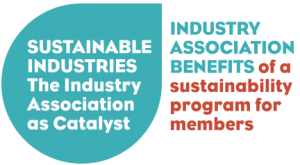A series – How to build industry association sustainability programs
Part 1 of 6
 Sustainability mega-forces are changing the way business competes and thrives. What are these mega-forces? Think growing global population; urbanization; climate change; food, water and resource scarcity and the increasing divide between the rich and poor. They are big issues with powerful influence. In the face of these external pressures, companies will need to adapt their business models in order to manage risk and create value for their organizations. Yet companies cannot become sustainable on their own. They quickly will find that they need to work with their industry peers and competitors to tackle systemic barriers.
Sustainability mega-forces are changing the way business competes and thrives. What are these mega-forces? Think growing global population; urbanization; climate change; food, water and resource scarcity and the increasing divide between the rich and poor. They are big issues with powerful influence. In the face of these external pressures, companies will need to adapt their business models in order to manage risk and create value for their organizations. Yet companies cannot become sustainable on their own. They quickly will find that they need to work with their industry peers and competitors to tackle systemic barriers.
Enter industry and professional associations. How are they prepared to support their members in this new competitive arena? This series will explore how industry associations can help their members advance along the sustainability path and help their industries become sustainable.
Scars, insights and tools
I had the privilege to sit on a board of an industry association for six years in the 1990s (where I spent much of my time advancing the CSR/sustainability cause and have a few scars to show for my efforts!) I experienced and learned a lot during that time and gained valuable insights for this work.
In 2007, along with Five Winds International, I conducted research for the Government of Canada on the role industry associations can play to help members improve their productivity and competitiveness through sustainability programs. In the past few years I have helped a number of associations develop sustainability guidelines and tools for their members.
More recently, I published guidelines for industry associations to develop sustainability programs for their members.
Why bother?
The first question for any industry association is, why bother?
Forward-thinking associations have answered that question and have developed sustainability programs for their members. For those associations that haven’t ventured into this territory yet, here are words of warning: if you drag your feet, you will put your members at risk – and ultimately jeopardize the viability of not only your industry association, but your entire sector.
Seven reasons why sustainability programs are good for industry associations
1.) Help attract and retain members: Sustainability/CSR programming increases the value and relevance of the association to current and prospective members. It reduces the risk that members will have their CSR and sustainability needs met by other organizations or initiatives.
2.) Enhance innovation in the sector: Cost-effective pre-competitive CSR/sustainability collaborations can result in industry innovation, enabling the industry to improve its collective CSR impacts while driving business and operational benefits.
3.) Build positive government and non-governmental organization (NGO) relations: Associations that increase their CSR or sustainability expertise are better positioned to contribute positively to regulatory initiatives by government and other agencies and to engage constructively with NGOs and other stakeholders. Associations with voluntary industry CSR/sustainability standards that exceed compliance requirements are able to forestall government regulation.
4.) Help identify industry priorities: Many generic global CSR/sustainability initiatives and standards are now available and this in turn can make priority-setting for members difficult. An industry approach can assist member companies to develop an industry-relevant model tailored to the sector’s most material risks and opportunities.
5.) Fulfill association goals: Typically association goals include assisting members to be competitive and profitable. CSR/sustainability is one tool to enhance member profitability and competitiveness.
6.) Build industry reputation and brand: An association CSR/sustainability program demonstrates the sector’s commitment to sustainable practices and leadership on CSR. It can build positive stakeholder relationships with customers, communities, NGOs, suppliers and others. In doing so, it enhances the sector’s social licence to operate and grow.
7.) Enhance employee recruitment and retention: Associations with CSR programs are able to attract and retain the best and brightest employees who prefer to work for organizations aligned with their values.
What you can do
Speak up! Send the Industry Association Roadmap to Sustainability, with an encouraging note, to your industry association representative. Or send it to an association you think needs help to build a more sustainable industry.


